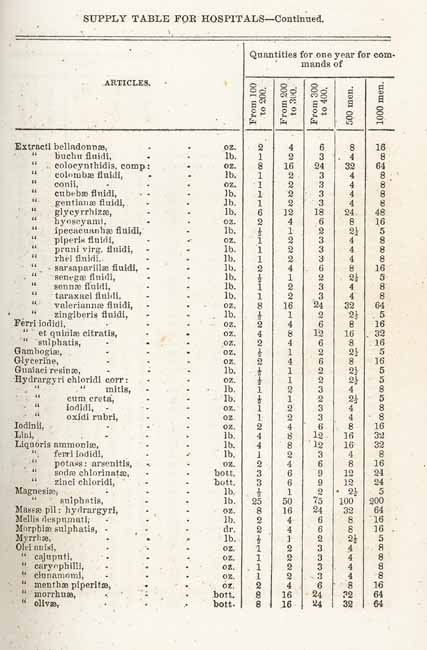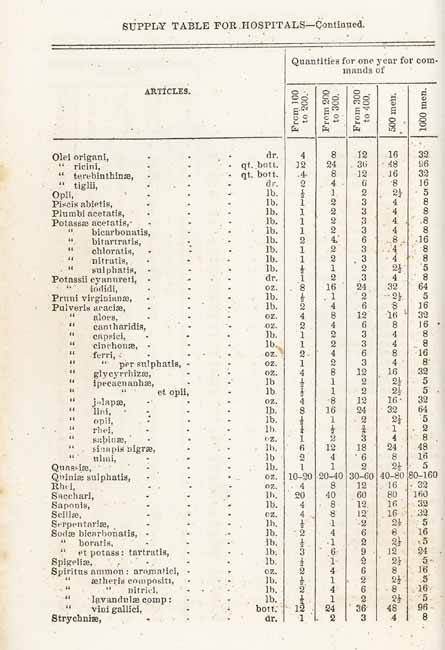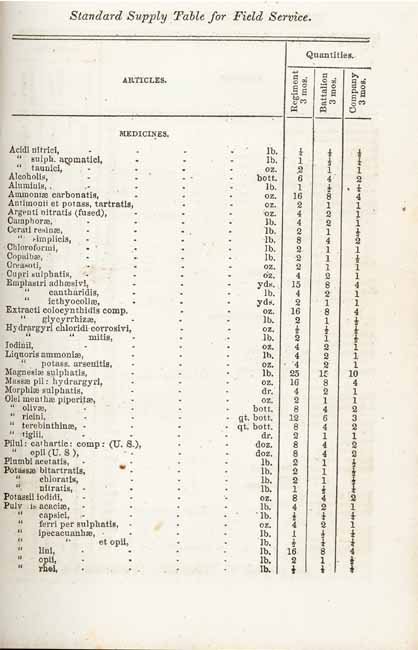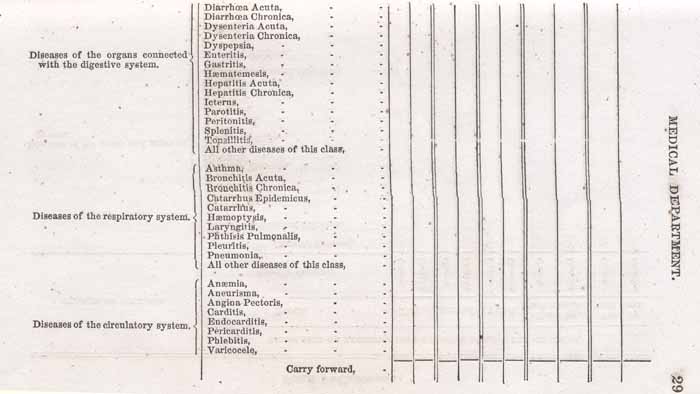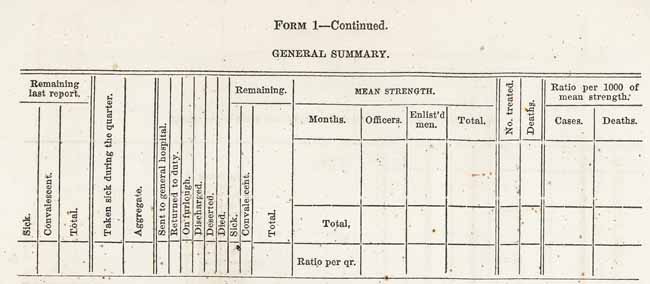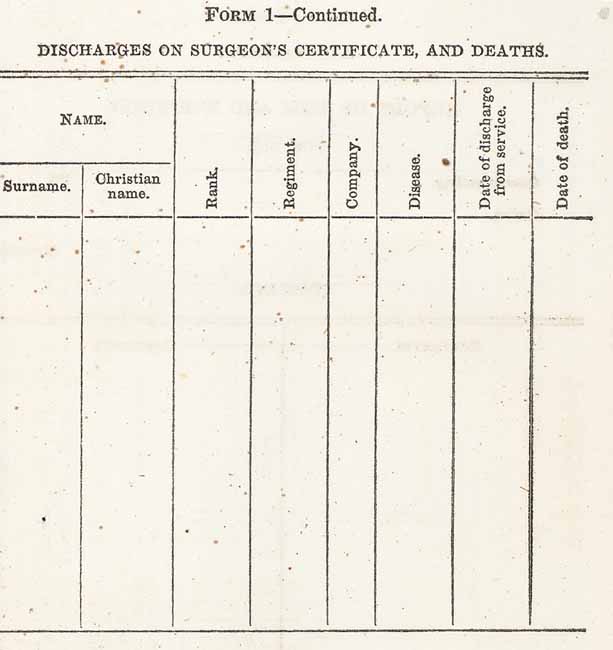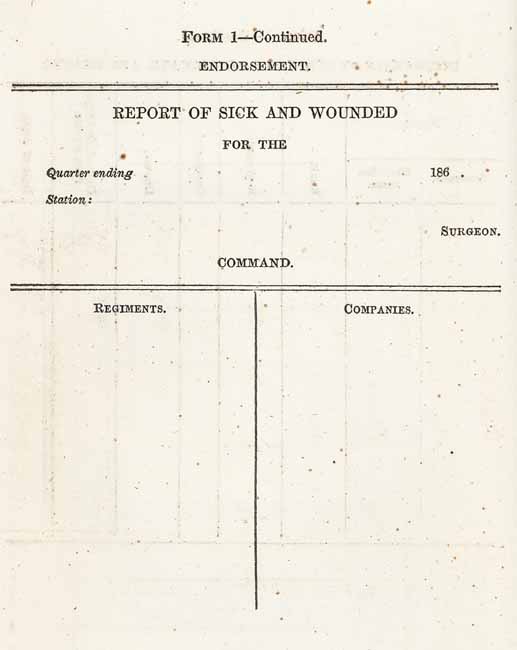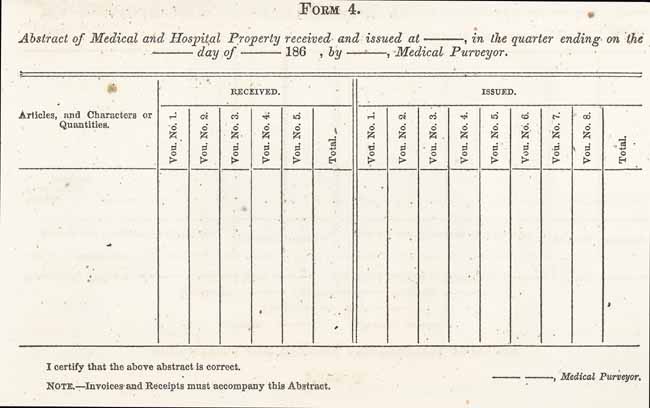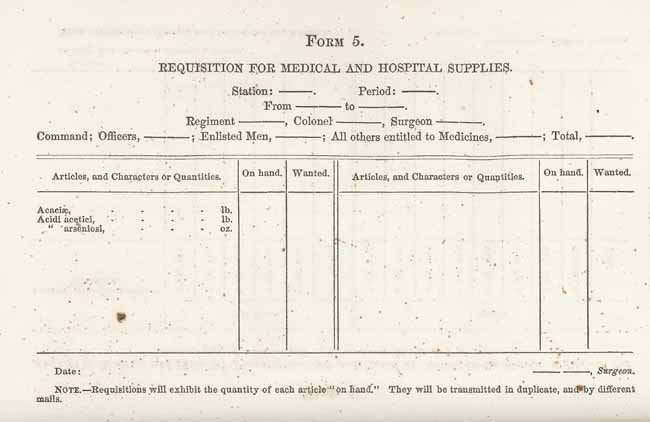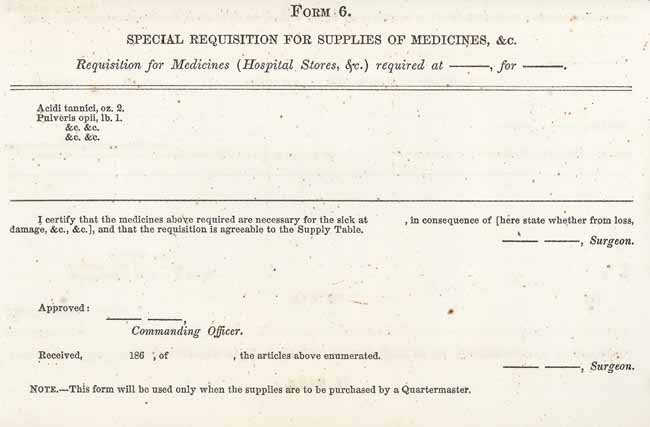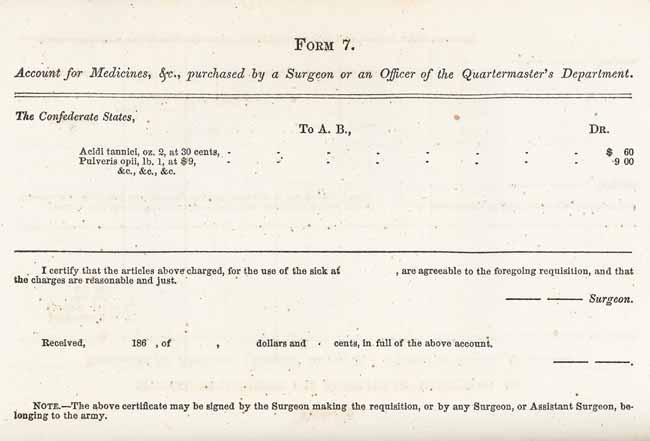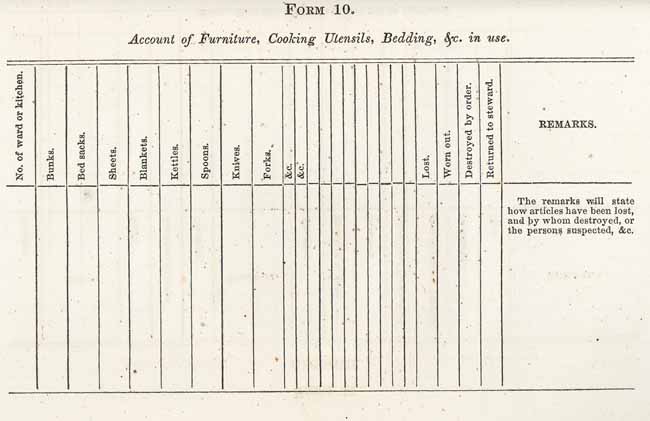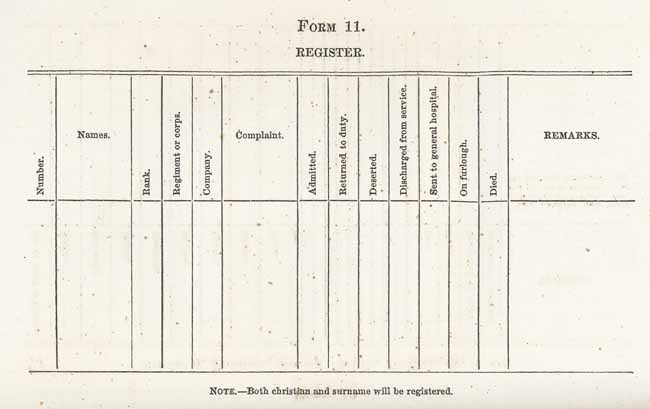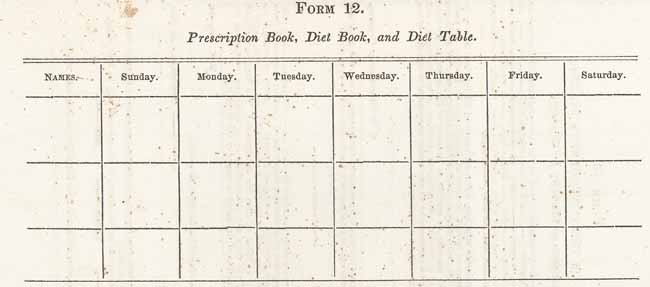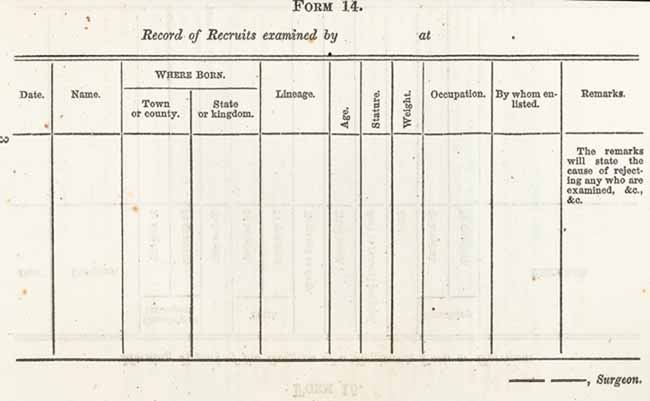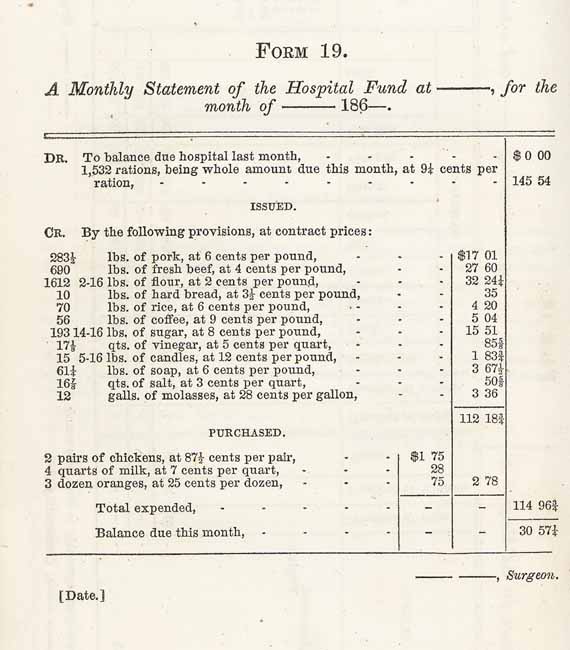Regulations for the Medical Department of the C.S. Army:
Electronic Edition.
Confederate States of America. War Dept.
Funding from the Institute of Museum and Library
Services
supported the electronic publication of this title.
Text scanned (OCR) by
Joshua G. McKim and Hong Zeng
Images scanned by
Hong Zeng
Text encoded by
Andrew Smith and Joshua G. McKim
First edition, 2001
ca. 75K
Academic Affairs Library, UNC-CH
University of North Carolina at Chapel Hill,
2001.
Source Description:
(title page) Regulations for the Medical Department of the C.S. Army.
58 p.
Richmond
Ritchie & Dunnavant, Printers
1862
Call number 1061conf (Rare Book Collection, University of North Carolina at Chapel Hill)
The electronic edition is a part of the UNC-CH
digitization project, Documenting the American South.
This electronic edition has been created by Optical
Character Recognition (OCR). OCR-ed text has been compared against the
original document and corrected. The text has been encoded using the
recommendations for Level 4 of the TEI in Libraries Guidelines.
Original grammar, punctuation, and spelling have been preserved. Encountered
typographical errors have been preserved, and appear in red type.
All footnotes are moved to the end of paragraphs in which the reference occurs.
The tables and forms on pp. 16-54 have been scanned as images.
Any hyphens occurring in line breaks have been
removed, and the trailing part of a word has been joined to
the preceding line.
All quotation marks, em dashes and ampersand have been transcribed as
entity references.
All double right and left quotation marks are encoded as " and "
respectively.
All single right and left quotation marks are encoded as ' and ' respectively.
All em dashes are encoded as--
Indentation in lines has not been preserved.
Running titles have not been preserved.
Spell-check and verification made against printed text using Author/Editor (SoftQuad) and Microsoft Word spell check programs.
Library of Congress Subject Headings, 21st edition, 1998
Languages Used:
- English
- Latin
LC Subject Headings:
- Confederate States of America. Army -- Medical supplies.
- Confederate States of America. Army -- Regulations.
- Confederate States of America. Army -- Sanitary affairs.
- Confederate States of America. Army. Medical Dept -- Rules and practice.
- Military hospitals -- Confederate States of America.
- United States -- History -- Civil War, 1861-1865 -- Equipment and supplies.
- United States -- History -- Civil War, 1861-1865 -- Medical care.
Revision History:
- 2001-03-15,
Celine Noel and Wanda Gunther
revised TEIHeader and created catalog record for the electronic edition.
-
2001-02-05,
Joshua G. McKim
finished TEI-conformant encoding and final proofing.
-
2000-10-16,
Andrew Smith
finished TEI/SGML encoding
- 2000-10-2,
Joshua G. Mckim and Hong Zeng
finished scanning (OCR) and proofing.
REGULATIONS
FOR THE
MEDICAL DEPARTMENT
OF THE
C. S. ARMY.
RICHMOND:
RITCHIE & DUNNAVANT, PRINTERS.
1862.
Page 3
WAR DEPARTMENT,
April 10th, 1862.
The following Regulations for the Medical Department of the Army of the Confederate States are published, by direction of the PRESIDENT, for the government of all concerned. They will accordingly be strictly obeyed, and nothing contrary to their tenor will be enjoined or permitted in any part of the forces of the Confederate States, by any officer whatsoever.
GEO. W. RANDOLPH,
Secretary of War.
Page 5
REGULATIONS
FOR THE
MEDICAL DEPARTMENT.
1. The Surgeon General is charged with the administrative details of the Medical Department; the government of hospitals; the regulation of the duties of the medical officers, issuing orders and instructions relating to their professional duties; and the employment of acting medical officers when needed. All communications from medical officers, which require his action, will be made directly to him.
2. An army corps or military department will have a medical officer assigned as Medical Director, who will have the general control of the medical officers and hospitals.
3. A division will have a medical officer assigned, on the recommendation of the Medical Director, as Chief Surgeon; or the senior medical officer of the division, on the same recommendation, will be relieved from regimental duty, and placed in general charge as Chief Surgeon of Division.
4. A brigade will be under the general medical charge of the Senior Surgeon of Brigade, who will not be relieved from regimental duty.
5. Medical Directors, Chief Surgeons of Divisions, and Senior Surgeons of Brigades will inspect the hospitals of their commands, and see that the rules and regulations are enforced, and the duties of the Surgeons and Assistant Surgeons are properly performed.
6. They will examine the case books, prescription and diet books, and ascertain the nature of diseases which may have prevailed, and their probable causes; recommend the best method of prevention, and also make
Page 6
such suggestions relative to the situation, construction and economy of the hospitals, and to the police of the camps, as may appear necessary for the benefit and comfort of the sick, and the good of the service.
7. Senior Surgeons of Brigades will receive the monthly reports of sick and wounded (Form 1), required from the medical officers, and transmit them through the Chief Surgeon of Division to the Medical Director.
8. The Medical Director will make to the Surgeon General a consolidated monthly report of the sick and wounded, from the monthly reports of the medical officers of the command.
9. Chief Surgeons of Divisions and Senior Surgeons of Brigades will see that the quarterly reports of sick and wounded, and monthly statements of hospital fund, required from the medical officers, are transmitted to the Surgeon General.
10. Senior Surgeons of Brigades will make to the Chief Surgeons of Divisions, and Chief Surgeons of Divisions will make to the Medical Director monthly returns of the medical officers of their commands. (Form 2.)
11. The Medical Director will make to the Surgeon General a monthly return of the medical officers of the command.
12. An army corps, or military department will have a medical officer assigned as Medical Purveyor, who, under the direction of the Surgeon General, will purchase all medical and hospital supplies required for the Medical Department, or will make requisitions for these supplies through the Surgeon General, on the principal purveying depots.
13. Medical Purveyors will make to the Surgeon General, at the end of each fiscal quarter, returns in duplicate (Form 3), of medical supplies received, issued, and remaining on hand, stating to whom, or from whom, and when and where issued or received. Other medical officers in charge of medical supplies will make similar returns semi-annually, on the 30th of June and the 31st of December; and all medical officers will make them when relieved from the duty to which their returns relate. The returns will show the condition of the stores, and particularly of the instruments, bedding, and furniture. Medical Purveyors will furnish abstracts of receipts and issues, with their returns (Form 4).
14. Medical disbursing officers will, at the end of each fiscal quarter, render to the Surgeon General, in duplicate, a quarterly account current of moneys received and expended, with the proper vouchers for the payments, and certificates that the services have been rendered and the supplies
Page 7
purchased and received for the medical service, and transmit to him an estimate of the funds required for the next quarter.
15. The medical supplies for the army are prescribed in the Standard Supply Tables for Hospitals and Field Service.
16. Medical and hospital supplies will be issued by Medical Purveyors, on requisitions (Form 5), in duplicate, approved by the Medical Director, and exhibiting the quantities on hand of articles wanted. The duplicate of the requisition, showing the actual issues and date thereof, will be forwarded by the Medical Purveyor to the Surgeon General.
17. When it is necessary to purchase medical supplies, those which are indispensable may be procured by the Quartermaster, if recourse cannot be had to a medical disbursing officer, on a special requisition (Form 6), and account (Form 7).
18. In every case of special requisition, a duplicate of the requisition shall, at the same time, be transmitted to the Surgeon General, for his information.
19. An officer transferring medical supplies, will furnish a certified invoice to the officer who is to receive them, and transmit a duplicate of it to the Surgeon General. The receiving officer will transmit duplicate receipts (specifying articles and quantities) to the Surgeon General, with a report of the quality and condition of the supplies, and report the same to the issuing officer. A medical officer, who turns over medical supplies to a Quartermaster for storage or transportation, will forward to the Surgeon General, with the invoice, the Quartermaster's receipts for the packages.
20. Medical officers will take up and account for all medical supplies of the army that come into their possession, and report, when they know it, to whose account they are to be credited.
21. Medical supplies are not to be detained or diverted from their destination, except in cases of absolute necessity, by commanding generals, who will promptly report the circumstances to the Adjutant General, that orders may be given for supplying the deficiency; and the medical officer receiving them will immediately report the fact to the Surgeon General; and, also, when practicable, notify the officer for whom they were intended.
22. In all official lists of medical supplies, the articles will be entered in the order of the Supply Tables.
23. The senior medical officer of each post, regiment, or detachment, will, with the approbation of the commanding officer, select a suitable site for the erection of a hospital, or of hospital tents.
Page 8
24. The senior medical officer of a hospital will distribute the patients, according to convenience, and the nature of their complaints, into wards or divisions, under the particular charge of the several assistant surgeons; and will visit them himself each day as frequently as the state of the sick may require, accompanied by the assistant, steward, and nurse.
25. His prescriptions of medicine and diet are to be written down at once in the proper book, with the name of the patient and the number of his bed; the assistants will fill up the diet table for the day, and direct the administration of the prescribed medicines. He will detail an assistant surgeon to remain at the hospital day and night, when the state of the sick requires it.
26. In distributing the duties of his assistants, he will ordinarily require the aid of one in the care and preparation of the hospital reports, registers, and records, the rolls, and descriptive lists; and of another, in the charge of the dispensary, instruments, medicines, hospital expenditures, and the preparation of the requisitions and returns.
27. He will enforce the proper hospital regulations to promote health and prevent contagion, by ventilated and not crowded rooms, scrupulous cleanliness, frequent changes of bedding and linen, occasional refilling of the bed sack and pillow ticks with fresh straw, regularity in meals, attention to cooking, &c.
28. He will cause to be printed, or written in a legible hand, and hung up in a conspicuous place in each ward, such rules and regulations as he may deem necessary for the guidance of the attendants, and the order, cleanliness, and convenience of the patients.
29. He will require the steward to take due care of the hospital stores and supplies; to enter in a book, daily (Form 8), the issues to the wardmasters, cooks, and nurses; to prepare the provision returns, and receive and distribute the rations.
30. He will require the wardmaster to take charge of the effects of the patients; to register them in a book (Form 9); to have them numbered and labelled with the patient's name, rank, and company; to receive from the steward the furniture, bedding, cooking utensils, &c., for use, and keep a record of them (Form 10), and how distributed to the wards and kitchens; and once a week to take an inventory of the articles in use, and report to him any loss or damage to them, and to return to the steward such as are not required for use.
31. Assistant Surgeons will obey the orders of their senior surgeon, see that subordinate officers do their duty, and aid in enforcing the regulations of the hospital.
Page 9
32. The cooks and nurses are under the orders of the steward. He is responsible for the cleanliness of the wards and kitchens, patients and attendants, and all articles in use. He will ascertain who are present at sunrise and sunset, and tattoo, and report absentees.
33. At surgeon's call the sick then in the companies will be conducted to the hospital by the first sergeants, who will each hand to the surgeon in his company book, a list of all the sick of the company, on which the surgeon shall state who are to remain or go into the hospital; who are to return to quarters as sick or convalescent; what duties the convalescents in quarters are capable of; what cases are feigned; and any other information in regard to the sick of the company, he may have to communicate to the company commander.
34. Soldiers in hospital, patients or attendants, except stewards, shall be mustered on the rolls of their company, if it be present at the post.
35. When a soldier in hospital is detached from his company so as not to be mustered with it for pay, his company commander shall certify and send to the hospital his descriptive list and account of pay and clothing, containing all necessary information relating to his accounts with the Confederate States, on which the surgeon shall enter all payments, stoppages, and issues of clothing to him in hospital. When he leaves the hospital, the medical officer shall certify and remit his descriptive list, showing the state of his accounts. If he is discharged from the service in hospital, the surgeon shall make out his final statements for pay and clothing. If he dies in hospital, the surgeon shall take charge of his effects, and make the reports required in the general regulations concerning soldiers who die absent from their companies.
36. Patients in hospital are, if possible, to leave their arms and accoutrements with their companies, and in no case to take ammunition into the hospital.
37. When a patient is transferred from one hospital to another, the medical officer shall send with him an account of his case, and the treatment.
38. The regulations for the service of hospitals apply, as far as practicable, to the medical service in the field.
39. In the field, the senior medical officer will inspect camps, and urge the enforcement of stringent rules of police.
40. The senior medical officer of each hospital, post, regiment, or detachment, will keep the following records, and deliver them to his successor: A register of patients (Form 11); a prescription and diet book
Page 10
(Form 12); a case book; copies of his requisitions, returns of property, and reports of sick and wounded; and an order and letter book, in which will be transmitted all orders and letters relating to his duties.
41. He will make the muster and pay rolls of the hospital steward and laundresses, and of all soldiers in hospital, sick or on duty, detached from their companies, on the forms furnished from the Adjutants and Inspector-General's office, and according to the directions expressed on them.
42. The extra pay allowed to soldiers acting as cooks and nurses in hospitals, will be paid by the Quartermaster Department, the extra service being noted on the hospital muster rolls.
43. The senior medical officer will select the cooks, nurses, and laundresses, with the approval of the commanding officer. Cooks and nurses, taken from the privates, will be exempt from other duty, but shall attend the parades for muster and weekly inspection of their companies at the post, unless specially excused by the commanding officer. They will not be removed except for misdemeanor, and at the request of the medical officer, unless in cases of urgent necessity, and then only by the order of the commanding officer.
44. Cooks and nurses, other than enlisted men or volunteers, are subject to military control. They will be paid on the hospital muster rolls, by the Quartermaster Department, at the rates at which they have been engaged, which, in no case, will exceed $18 50 per month, being the pay proper of an enlisted man, together with the extra pay allowed in paragraph 42. They should not be employed for a less period than a calendar month.
45. Ordinarily, hospital attendants are allowed as follows: To a general hospital, one steward, one nurse as wardmaster, one nurse to ten patients, one laundress to twenty, and one cook to thirty: to a hospital where the command exceeds five companies, one steward and wardmaster, one cook, two laundresses, and four nurses; to a post or garrison of one company, one steward and wardmaster, one nurse, one cook, and one laundress; and for every two companies more, one nurse; at arsenals, where the number of enlisted men is not less than fourteen, one laundress is allowed. The allowance of hospital attendants in the field will be, for commands of one company and not exceeding five, one steward, one cook, and for each company, one nurse; for regiments, or commands of over five companies, one steward, two cooks, and for each company, one nurse.
Page 11
46. Medical officers, where on duty, will attend the officers and enlisted men, and the laundresses authorized by law; all at stations where other medical attendance cannot be procured, and on marches, the hired men of the army. Medicines will be dispensed to the families of officers and soldiers, and to all persons entitled to medical attendance; hospital stores to enlisted men.
47. Medical officers in giving certificates of disability (Form 13), are to take particular care in all cases that have not been under their charge; and especially in epilepsy, convulsions, chronic rheumatism, derangement of the urinary organs, ophthalmia, ulcers, or any obscure disease, liable to be feigned or purposely produced; and in no case shall such certificate be given until after sufficient time and examination to detect any attempt at deception.
48. In passing a recruit, the medical officer is to examine him stripped; to see that he has free use of his limbs; that his chest is ample; that his hearing, vision, and speech are perfect; that he has no tumors, or ulcerated or extensively cicatrized legs; no rupture, or chronic cutaneous affection; that he has not received any contusion, or wound of the head, which may impair his faculties; that he is not a drunkard; is not subject to convulsions, and has no infectious disorder, nor any other that may unfit him for military service.
49. Medical officers attending recruiting rendezvous will keep a record (Form 14) of all the recruits examined by them. Books for this purpose will be procured by applying to the Surgeon General, to whom they will be returned when filled.
50. As soon as a recruit joins any regiment or station, he shall be examined by the medical officer, and vaccinated when it is required, vaccine virus being kept on hand by timely requisition on the Surgeon General.
51. The senior medical officer of each hospital, post, regiment, or detachment; will make monthly to the Medical Director, and quarterly to the Surgeon General, a report of sick and wounded, of deaths, and of discharges for disability (Form I); and transmit to the Surgeon General a copy of the Monthly Statement of the Hospital Fund (Form 19).
52. After surgeon's call, he will make a morning report of the sick to the commanding officer (Form 15).
53. Every medical officer will report to the Surgeon General and to the Medical Director, the date when he arrives at a station, or when he leaves it, and his orders in the case, and at the end of each month, whenever not at his station, whether on service or on leave of absence; and when on leave of absence, his post-office address for the next month.
Page 12
54. They will promptly acknowledge the receipt of all orders relating to their movements; and in all official communications, when at stations the positions of which are not well known, they will state the nearest post-office or well known place.
55. When it is necessary to employ a private physician as medical officer, the Medical Director, or if circumstances preclude reference to him, the commanding officer may execute a written contract (notifying the Medical Director), conditioned as in Form 16, at a stated compensation, not to exceed $50 a month when the number of officers and men, with authorized laundresses, is 100 or more; $40 when it is from 50 to 100, and $30 when it is under 50.
56. But when he is required to abandon his own business, and give his whole time to the public service, the contract may be not to exceed $80 a month; and not to exceed $100, besides transportation in kind, to be furnished by the Quartermaster's Department, where he is required to accompany troops on marches or transports. But a private physician will not be employed to accompany troops on marches or transports, except by orders from the War Department, or, in particular and urgent cases, by the order of the officer directing the movement.
57. And when a private physician is required to furnish medicines, he will be paid in addition from 25 to 50 per cent., to be determined by the Surgeon General, on the amount allowed by contract.
58. In all cases, a duplicate of the contract, with a particular statement appended, of the circumstances which make it necessary, will be transmitted forthwith to the Surgeon General for approval; and the commanding officer for the time being will at once discontinue it, whenever the necessity for it ceases or the Surgeon General may so direct.
59. The physician's account of pay due must be sent to the Surgeon General for payment, vouched by the certificate of the commanding officer, that it is correct and agreeable to contract, and that the services have been duly rendered. But on the frontier or in the field, when it cannot conveniently be submitted to the Surgeon General, the contract having already received his approval, the account may be paid on the order of the commanding officer, not to exceed the regulated amount, by a Quartermaster or a medical disbursing officer.
60. Private physicians, employed by contract, will conform to the regulations, and accordingly will keep all the records, and make the reports, requisitions, and returns required from medical officers.
61. When medical attendance is required by officers or enlisted men on service, and the attendance of a medical officer cannot be had, the officer,
Page 13
or if there be no officer, then the enlisted man, may employ a private physician, and a just account therefor will be paid by the Medical Bureau.
62. The account will set out the name of the patient, the date of and charge for each visit, and for medicines. The physician will make a certificate to the account in case of an officer, or affidavit in case of an enlisted man, that the account is correct, and the charges are the customary charges of the place.
63. The officer will make his certificate, or the enlisted man his affidavit, to the correctness of the account, that he was on service at the place and stating the circumstances preventing him from receiving the service of a medical officer.
64. When the charge is against an officer, he will pay the account if practicable, and transmit it to the Medical Bureau for reimbursement. In all other cases, the account will be transmitted to the Medical Bureau for settlement.
65. If the charge is against a deceased officer or enlisted man, the physician will make the affidavit, before required, to the account, and that he has been paid no part of it.
66. No charges for consultation fees will be paid by the Medical Bureau; nor will any account for medical attendance or medicines be paid, if the officer or enlisted man be not on service.
67. A board of not less than three medical officers will be appointed from time to time, by the Secretary of War, to examine applicants for appointment of assistant surgeons in the regular army, and assistant surgeons for promotion. And no one shall be so appointed or promoted until so examined and found qualified.
68. The board will scrutinize rigidly the moral habits, professional acquirements, and physical qualifications of the candidates, and report favorably, either for appointment or promotion, in no case admitting of a reasonable doubt.
69. The Secretary of War will designate the applicants to be examined for appointment of assistant surgeon. They must be between 21 and 25 years of age. The board will report their respective merits in the several branches of the examination, and their relative merit from the whole; agreeably whereto, if vacancies happen within two years thereafter, they will receive appointments and take rank in the medical corps.
70. When an assistant surgeon has served five years, he is subject to be examined for promotion. If he decline the examination, or be found
Page 14
not qualified by moral habits or professional acquirements, he ceases to be a medical officer of the army.
71. An applicant for appointment failing at one examination, may be allowed a second after two years; but never a third.
72. The Secretary of War will appoint, on the recommendation of the Surgeon General, from the enlisted men of the army, or cause to be enlisted, as many competent hospital stewards as the service may require.
73. The senior medical officer of a command requiring a steward, may recommend a competent non-commissioned officer or soldier to be appointed, which recommendation the commanding officer shall forward to the Adjutant and Inspector-General of the Army, with his remarks thereon, and with the remarks of the company commander.
74. When no competent enlisted man can be procured, the medical officer will report the fact to the Surgeon General. Applications and testimonials of competency, from persons seeking to be enlisted for hospital stewards, may be addressed to the Surgeon General.
75. The commanding officer may re-enlist a hospital steward at the expiration of his term of service, on the recommendation of the medical officer.
76. No soldier, or citizen, will be recommended for appointment who is not known to be temperate, honest, and in every way reliable, as well as sufficiently intelligent, and skilled in pharmacy, for the proper discharge of the responsible duties likely to be devolved upon him. Until this is known, he will be appointed an acting steward by the medical officer, with the approval of the commanding officer, and will be entitled to the pay and allowances of hospital steward.
77. Hospital stewards, appointed by the Secretary of War, whenever stationed in places whence no post return is made to the Adjutant General's office, or when on furlough, will, at the end of every month, report themselves, by letter, to the Adjutant and Inspector-General and Surgeon General, as well as to the Medical Director of the military department in which they may be serving; to each of whom they will also report each new assignment to duty, or change of station, ordered in their case, noting carefully the number, date, and source of the order directing the same. They will likewise report monthly, when on furlough, to the medical officer in charge of the hospital to which they are attached.
78. The jurisdiction and authority of courts martial are the same with reference to hospital stewards as in the cases of other enlisted men. When, however, a hospital steward is sentenced by an inferior court to be reduced
Page 15
to the ranks, such sentence, though it may be approved by the reviewing officer, will not be carried into effect until the case has been referred to the Secretary of War for final action. In these cases of reduction, the application of the man for discharge from service, though not recognized as of right, will generally be regarded with favor, if his offence has not been of too serious a nature, and especially when he has not been recently promoted from the ranks.
79. As the hospital stewards, appointed by the Secretary of War, are permanently attached to the Medical Department, their accounts of pay, clothing, &c., must be kept by the medical officers under whose immediate direction they are serving, who are also responsible for certified statements of such accounts, and correct descriptive lists of such stewards, to accompany them in case of transfer; as, also, that their final statements and certificates of discharge are accurately made out, when they are at length discharged from service.
Page 16
Standard Supply Table for General and Post Hospitals.
[In General Hospitals, the supplies for every 100 sick will correspond with the allowance to commands of 500 men.]
*To be issued to posts where simple cerate cannot be sent without becoming rancid.
Page 17
SUPPLY TABLE FOR HOSPITALS--Continued.
Page 18
SUPPLY TABLE FOR HOSPITALS--Continued.
Page 19
SUPPLY TABLE FOR HOSPITALS--Continued.
*Four extra fleams to each lancet.
*With cases.
*1 Davidson's; 1, 4 oz., 1, 8 oz.
*1 hard India rubber; 2 glass.
Page 20
SUPPLY TABLE FOR HOSPITALS--Continued.
Page 21
SUPPLY TABLE FOR HOSPITALS--Continued.
*Assorted.
*18 inches by 4.
*4 inches by 1.
§2 cups to 1 glass.
*Assorted sizes--"Official business" printed on each.
¶Foolscap, letter and note--white; blue ruled.
Page 22
SUPPLY TABLE FOR HOSPITALS--Continued.
*One quarter, woolen; three quarters, cotton.
If the following articles of Hospital Furniture cannot be obtained with the hospital fund, they may be procured from a quartermaster or medical disbursing officer, by special requisition:
- Basins, wash.
- Bowls.
- Boxes, pepper and salt.
- Brushes.
- Buckets.
- Candlesticks.
- Clothes lines.
- Cups.
- Dippers and ladles.
- Graters.
- Gridirons.
- Kettles, tea.
- Knives and forks.
- Lanterns.
- Locks and keys.
- Pans, frying.
- Pans, sauce.
- Pitchers.
- Plates.
- Pots, chamber and chair.
- Pots, coffee and tea.
- Pots, iron.
- Sadirons.
- Shovels, fire.
- Skillet, with cover.
- Snuffers.
- Spoons.
- Tongs and pokers.
- Tumblers.
- Woodsaws.
ARTICLES.
Page 23
Standard Supply Table for Field Service.
Page 24
SUPPLY TABLE FOR FIELD SERVICE--Continued.
*Half glass, half tin.
*1 Davidson's; 1 hard rubber, 6 oz.
Page 25
SUPPLY TABLE FOR FIELD SERVICE--Continued.
*To be reserved for use in surgical operations in the night.
- *1 dozen, 1 inch wide, 1 yard long.
- 2 dozen, 2 inches wide, 3 yards long.
- 2 dozen, 2 1/2 inches wide, 3 yards long.
- 1 dozen, 3 inches wide, 4 yards long.
- 1/2 dozen, 3 1/2 inches wide, 5 yards long.
- 1/2 dozen, 4 inches wide, 6 yards long.
*According to pattern, of same dimensions with ordinary knapsacks, of light material, and to be covered with canvas. It is to be carried on a march or in battle by a hospital orderly, who is habitually to follow the medical officer. The purpose of this knapsack is to carry such instruments, dressings, and medicines, as may be needed in an emergency on the march or in the field.
Page 26
SUPPLY TABLE FOR FIELD SERVICE--Continued.
*Horse litters required for service on ground not admitting the use of two wheeled carriages, to be composed of a canvas bed similar to the present stretcher, and of two poles; each sixteen feet long, made in sections, with head and foot pieces constructed to act as stretchers to keep the poles apart.
*6 oz., 2 oz., minim.
*2 cups to 1 glass.
§Of hard India rubber or other material. Shovel.
*50 letter, 25 note, 25 large. "Official business" printed on each.
¶2 foolscap, 6 letter, 4 note, white; blue ruled.
Page 27
NOTE TO PRECEDING TABLE.
- 8 Basins, tin.
- 2 Boxes, pepper and salt.
- 6 Cups, tin.
- 4 Canisters, for tea, coffee, sugar and butter.
- 2 Dippers and ladles.
- 1 Grater.
- 1 Gridiron.
- 1 Kettle, tea, iron.
- 12 Knives and forks.
- 6 Mugs, Britannia, half-pint.
- 1 Pan, frying.
- 1 Pan, sauce.
- 8 Plates (6) and dishes (2), tin.
- 2 Pots, coffee and tea, tin.
- 1 Pot, iron.
- 1 Skillet, with cover.
- 12 Spoons, iron [table (6) and tea (6)]
- 1 Tray, tin.
- 6 Tumblers, tin.
FURNITURE OF MESS CHEST.
The Standard Supply Tables contain all the articles to be purchased by medical purveyors, except on the orders of the Surgeon General; but any less quantity may be required, or any article omitted, at the discretion of the medical officer.
Page 28
FORM 1.
Report of the Sick and Wounded at [blank], for the [blank] ending [blank] 18[blank].
Page 29
FORM 1--Continued.
Page 30
FORM 1--Continued.
Page 31
FORM 1--Continued.
Page 32
FORM 1--Continued.
Page 33
FORM 1--Continued.
NOTE.--cases, new diseases supervening on those first registered.
Page 34
FORM 1--Continued
GENERAL SUMMARY.
DIRECTIONS.--When new diseases occur among those already sick, they will be included in the "cases," and the number of such new cases will be specified in the foot note. In this report, the utmost punctuality and exactness will be required, and its nomenclature will be strictly observed. Diseases not specified will be reported in the class to which they belong, under the heading "All other diseases of this class." It will be accompanied with a general Sanitary Report, to be written on alternate pages of foolscap paper, with a margin of one inch on the left side of each page, and to be folded in four equal folds; in which the medical officer will furnish information respecting all those agencies which may have influenced the sickness and mortality of the troops--such as the medical topography of the station; the climate; prevalent diseases in the vicinity; the duty and employment of the troops; the nature of their barrack and hospital accommodations; diet; water; clothing; and general habits of the men as to cleanliness, temperance, &c. Cases of unusual interest will be reported in detail. Diseases of women and children, if given, must be reported separately. No duplicate of this report is required. It will be rendered to the Surgeon General March 31, June 30, September 30, and December 31.
In consolidated and other monthly reports of sick and wounded, the general arrangement and the nomenclature of this form will be followed.
Page 35
FORM 1--Continued.
DISCHARGES ON SURGEON'S CERTIFICATE, AND DEATHS.
REMARKS.
NOTES.--Discharges on Surgeon's certificate, and deaths occurring among those of the command not on sick report, will be also reported, but separated from the others by a double line drawn across the page. The remarks will, in each case, specify the manner in which the disease originated, when it is known.
In every case of the death of an officer, whether on duty or not, a special report is to be made to the Surgeon General.
Page 36
FORM 1--Continued.
ENDORSEMENT.
Page 37
FORM 2.
Return of the Medical Officers of the Regular Army, Volunteer Corps, and Militia, including Physicians employed under contract, serving in the Department of--, for the month of--186[blank].
NOTE.--The names will be arranged in the following order: 1st, Medical Officers of the Regular Army; 2d, those of Volunteer Corps and Militia; 3d, Private Physicians. In the column of "Remarks" will be noted all changes in the position of medical officers and private physicians, whether on duty or on leave of absence; giving the number, date, and source of the order directing or authorizing such change, the time of the departure of the officer from their posts, and the date of their return to duty. If to a new post, its position must be indicated by reference to some known point, as--miles north from--river, town, or post office. The remarks opposite the names of Private Physicians will state, in addition to the above, the name and rank of the party making the contract, the date thereof, the monthly compensation, and the date of their discharge from service.
The Medical Directors will require from the Medical Officers and Private Physicians in their respective Departments, monthly reports to enable them to make out and transmit this Return to the Surgeon General.
Page 38
FORM 3.
Return of Medical and Hospital Property.
I certify, on honor, that the above return is correct, to the best of my knowledge, and that the medicines and stores have been expended with the sick belonging to the army alone.
----, Surgeon.
NOTE.--Returns will always be transmitted in duplicate, and by different mails.
Articles purchased with the Hospital Fund will not be accounted for on this Return.
Page 39
FORM 4.
Abstract of Medical and Hospital Property received and issued at--, in the quarter ending on the-- day of-- 186[blank], by--, Medical Purveyor.
I certify that the above abstract is correct.
----, Medical Purveyor.
NOTE.--Invoices and Receipts must accompany this Abstract.
Page 40
FORM 5.
REQUISITION FOR MEDICAL AND HOSPITAL SUPPLIES.
Date:
----, Surgeon.
NOTE.--Requisitions will exhibit the quantity of each article "on hand." They will be transmitted in duplicate, and by different mails.
Page 41
FORM 6.
SPECIAL REQUISITION FOR SUPPLIES OF MEDICINES, &c.
Requisition for Medicines (Hospital Stores, &c.) required at--, for--.
I certify that the medicines above required are necessary for the sick at ----Surgeon. ----Commanding Officer. ----Surgeon. NOTE.--This form will be used only when the supplies are to be purchased by a Quartermaster.
I certify that the articles above charged, for the use of the sick at ----Surgeon. ----. NOTE--.The above certificate may be signed by the Surgeon making the requisition, or by any Surgeon, or Assistant Surgeon, belonging to the army.
A B, of Captain--'s company (--), of the--regiment of Confederate States--, was enlisted by--, of the--regiment of--, at--, on the-- day of--, to serve--years. He was born in--, in the State of--, is-- years of age,--feet--inches high,--complexion,-- eyes,--hair, and by occupation when enlisted a--. During the last two months said soldier has been unfit for duty--days. (The company commander will here add a statement of all the facts known to him concerning the disease or wound, or cause of disability of the soldier; the time, place, manner, and all the circumstances under which the injury occurred, or disease originated or appeared; the duty, or service, or situation of the soldier at the time the injury was received or disease contracted, or supposed to be contracted; and whatever facts may aid a judgment as to the cause, immediate or remote, of the disability, and the circumstances attending it.) Station: C D, Commanding Company. (When the facts are not known to the company commander, the certificate of any officer, or affidavit of other person having such knowledge, will be appended.)
I CERTIFY that I have carefully examined the said--of Captain--'s company, and find him incapable of performing the duties of a soldier because of [here describe particularly the disability, wound, or disease; the extent to which it deprives him of the use of any limb or faculty, or affects his health, strength, activity, constitution, or capacity to labor or earn his subsistence.) The Surgeon will add, from his knowledge of the facts and circumstances, and from the evidence in the case, his professional opinion of the cause or origin of the disability. E F, Surgeon. ----,Commanding the Post. NOTES--1. When a probable case for pension, special care must be taken to state the degree of disability. [Blanks for this form are issued from the Adjutant General's office.]
----, Surgeon.
This contract, entered into this--day of--186--, at--, State of--, between--, of the C. S. Army, and Dr. --of --, in the State of--, witnesseth, that for the consideration hereafter mentioned, the said Dr.--promises and agrees to perform the duties of a medical officer, agreeably to the Army Regulations, at-- (and to furnish the necessary medicines). And the said----promises and agrees, on behalf of the Confederate States, to pay, or cause to be paid, to the said Dr.--the sum of--dollars for each and every month he shall continue to perform the services above stated, which shall be his full compensation, and in lieu of all allowances and emoluments whatsoever (except that for medicines furnished, which shall be at the rate of-- per cent. on his monthly pay, to be determined by the Surgeon General). This contract to continue till determined by the said doctor, or the commanding officer for the time being, or the Surgeon General. Signed, sealed and delivered, in presence of--. "I certify that the number of persons entitled to medical attendance, agreeably to regulations, at--, is--; that no competent physician can be obtained at a lower rate; and that the services of a private physician are necessary, for the following reasons: [Here make the particular statement required in paragraph 58; reporting, also, whether a medical officer of the army was near, and if so, that his services could not be rendered; and when the contract allowed $80 per month, whether it was necessary for the physician to abandon his own business, and give his whole time to the public service.] ----, Medical Director,
----, of the--regiment of--, having applied for a certificate on which to ground an application for leave of absence, I do hereby certify that I have carefully examined this officer, and find that--. [Here the nature of the disease, wound, or disability, is to be fully stated, and the period during which the officer has suffered under its effects.] And that, in consequence thereof, he is, in my opinion, unfit for duty. I further declare my belief that he will not be able to resume his duties in a less period than--. [Here state candidly and explicitly the opinion as to the period which will probably elapse before the officer will be able to resume his duties. When there is no reason to expect a recovery, or when the prospect of recovery is distant and uncertain, it must be stated.] Dated--, this--day of--.
Signature of the Medical Officer.----.
The A. C. S. will issue agreeably to the above return.
----, Surgeon C. S. A.
----, Surgeon.
1. Officers of the Medical Department, by virtue of their commissions, command enlisted men. 2. The Medical Director and the Medical Purveyor of a Military Department are each allowed one room as an office, and fuel from the 1st of October to the 30th of April, at the rate of one cord of wood per month for each office. 3. Ambulances are not to be used for any other than the specific purpose for which they are designed, viz: the transportation of the sick and wounded. 4. Hospital laundresses will be paid eight dollars per month, by the Quartermaster Department, on the hospital muster rolls, and will be allowed one ration per diem. 5. A regiment, in the field, is allowed two four-wheeled, and the same number of two-wheeled ambulances; and one wagon for the transportation of hospital supplies. 6. Hospital tents, having on one end a lapel, so as to admit of two or more tents being joined and thrown into one with a continuous covering or roof, will be made of these dimensions: Length, 14 feet; width, 15 feet; height (centre), 11 feet, with a wall 4 1/2 feet, and a "fly" of appropriate size. The ridge pole will be made in two sections, measuring 14 feet when joined. This tent will accommodate from eight to ten patients comfortably. The following allowance of tents for the sick, their attendants, and hospital supplies, will be issued on requisitions on the Quartermaster Department:
7. The following Blanks will be issued from the Surgeon General's office:
Page 42FORM 7.
Account for Medicines, &c., purchased by a Surgeon or an Officer of the Quartermaster's Department.
Page 43FORM 8.
Account of Hospital Stores, Furniture, &c. issued.
Page 44FORM 9.
Account of Clothing, Arms, Equipments, &c. of Patients in Hospital.
Page 45FORM 10.
Account of Furniture, Cooking Utensils, Bedding , &c. in use.
Page 46FORM 11.
REGISTER.
NOTE.--Both christian and surname will be registered.
Page 47FORM 12.
Prescription Book, Diet Book, and Diet Table.
The spaces in the Prescription Book are to be filled up with the prescriptions at length, the times of administering the medicines, and the quantities to be given at each time. The diet of the patients will be divided into full, half, and low, to be designated in the Diet Book by the letters F, H and L; and in order that the steward may have precise instructions for delivering the hospital stores, &c., the surgeon will, from time to time, insert in the Diet Book written directions of the quantity of each article in his store room which he may think necessary to each degree of diet. To each ten patients, for example, on low diet, a certain quantity of tea, sugar, &c. To each ten on half diet, a certain quantity of rice, milk, &c. These proportions will soon become familiar to the steward, who has only to refer to the letters in the Diet Book, to ascertain the whole quantity of any article to be delivered for the day, as well as the quantity for each ward. When any liquor is directed, or any other article not contained in these general instructions of the Surgeon, the precise quantity directed for each patient will be noted in the Diet Book. The Diet Tables are to be filled up daily from the Diet Book, and hung up in each ward of a general hospital.
Page 48FORM 13.
ARMY OF THE CONFEDERATE STATES.
Certificate of Disability for Discharge.
Date:
(Duplicates.)
2. The place where the soldier desires to be addressed may be here added.
Town--, County--, State --.
Page 49FORM 14.
Record of Recruits examined by
Page 50FORM 15.
Morning Report of the Surgeon of a Regiment, Post, or Garrison.
Page 51FORM 16.
Contract with a private Physician.
----, [SEAL.]
----, [SEAL.]
Or Commanding Officer."
Page 52Form 17.
Form of a Medical Certificate.
Page 53FORM 18.
Provision Return for the Hospital at--, for--days, commencing--, and ending--.
----, Commanding Post.
Page 54FORM 19.
A Monthly Statement of the Hospital Fund at--, for the
month of--186--.
Page 55ADDENDA.
COMMANDS Hospital Tents. Sibley Tents. Common Tents. For one company, -- 1 1 For three companies, 1 1 1 For five companies 2 1 1 For seven companies, 2 1 1 For ten companies, 3 1 1
Page 56
8. Official letters addressed to the Surgeon General, by medical officers of the army, will be written on letter paper (quarto post) whenever practicable, and not on note or foolscap paper. The letter must be folded in three equal folds parallel with the writing, and endorsed across that fold which corresponds with the top of the sheet, thus:
(Name and rank of writer.)
(Post or station and date of letter.)
(Analysis of contents.)
9. Medical officers will not give Certificates of Disability for Discharge from the service, on account of single Reducible Hernia, when the patient is under thirty-five years of age.
Page 57
EXTRACTS FROM THE REGULATIONS FOR THE ARMY.
928. No officer making returns of property shall drop from his return any public property as worn out or unserviceable until it has been condemned, after proper inspection, and ordered to be so dropped.
934. Every officer having public money to account for, and failing to render his account thereof quarter-yearly, with the vouchers necessary to its correct and prompt settlement, within three months after the expiration of the quarter, if resident in the Confederate States, and within six months if resident in a foreign country, will be promptly dismissed by the President, unless he shall explain the default to the satisfaction of the President.
935. Every officer entrusted with public money or property shall render all prescribed returns and accounts to the bureau of the department in which he is serving, where all such returns and accounts shall pass through a rigid administrative scrutiny before the money accounts are transmitted to the proper offices of the Treasury Department for settlement.
1040. Officers receiving clothing or camp and garrison equipage, will render quarterly returns of it to the Quartermaster General.
1111. Issues to the hospital will be on returns by the medical officer (Form 18), for such provisions only as are actually required for the sick and the attendants. The cost of such parts of the ration as are issued will be charged to the hospital at contract or cost prices, and the hospital will be credited by the whole number of complete rations due through the month at contract or cost prices; the balance, constituting the Hospital Fund, or any portion of it, may be expended by the commissary, on the requisition of the medical officer, in the purchase of any article for the subsistence or comfort of the sick, not authorized to be otherwise furnished (see Form 19). At large depots or general hospitals, this fund may be partly expended for the benefit of dependent posts or detachments, on requisitions approved by the Medical Director or Senior Surgeon of the district.
1117. An extra issue of fifteen pounds of tallow or ten of sperm candles, per month, may be made to the principal guard of each camp and
Page 58
garrison, on the order of the commanding officer. Extra issues of soap, candles, and vinegar, are permitted to the hospital when the surgeon does not avail himself of the commutation of the hospital rations, or when there is no hospital fund; salt, in small quantities, may be issued for public horses and cattle. When the officers of the Medical Department find anti-scorbutics necessary for the health of the troops, the commanding officer may order issues of fresh vegetables, pickled onions, sourkrout, or molasses, with an extra quantity of rice and vinegar. (Potatoes are usually issued at the rate of one pound per ration, and onions at the rate of three bushels in lieu of one of beans.) Occasional issues (extra) of molasses are made--two quarts to one hundred rations--and of dried apples of from one to one and a half bushels to one hundred rations. Troops at sea are recommended to draw rice and an extra issue of molasses in lieu of beans. When anti-scorbutics are issued, the medical officer will certify the necessity, and the circumstances which cause it, upon the abstract of extra issues.
ERRATUM.
Page 5, Regulation 4, 2nd line, insert the before "Brigade."
Return to Menu Page for Regulations for the Medical Department of... by Confederate States of America. War Dept
Return to The Southern Homefront, 1861-1865 Home Page
Return to Documenting the American South Home Page



